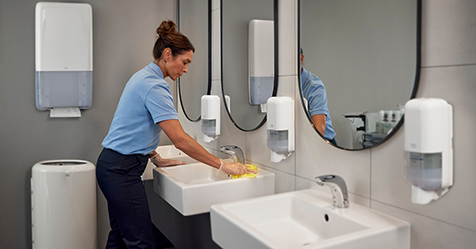Focus on High-Touch Hospital Surfaces
Discover five commonly overlooked—and under-cleaned—areas
July 30, 2020
Hospital environmental services (EVS) staff are trained to frequently clean high-touch surfaces to stop the spread of SARS-CoV-2 and other infectious pathogens. Commonly cleaned high-touch surfaces include door handles, elevator buttons, bed rails, and nurse call buttons. However, Infection Control Today reports there are five overlooked high-touch hospital surfaces EVS and medical staff may be overlooking:
- Break room areas: Hospital break rooms can be dirty, sticky, and sometimes smelly depending on when the fridge was last cleared out. Other appliances needing frequent cleanings include the coffee maker and microwave. Some break rooms contain staff lockers. All these break room surfaces are frequently used but are almost never considered for daily cleaning. These areas and machines should be disinfected with an U.S. Environmental Protection Agency (EPA)-registered healthcare grade disinfectant that is also food safe.
- Clipboards and paper charts: While most healthcare documentation has digitized in the last decade, the need for paper hasn’t fully gone away. Who cleans all those clipboards and charts that are frequently touched by a rotation of people throughout the day? Your facility should implement a policy that defines who is responsible for cleaning clipboards and charts and what EPA-registered disinfectants can be used without degrading the plastics or acrylics.
- Pneumatic tube system: These systems save time and improve efficiencies as they rapidly send lab samples, paperwork, and medications throughout the hospital. Unfortunately, unintended spills and dirty hands can cause these systems to accumulate and traffic pathogens within the facility if they’re not disinfected frequently. The carrier tubes should be disinfected between uses and the entire tube system should be cleaned on a scheduled basis.
- Medication dispensing machines: The machines used to safely store and dispense patient medications may be touched hundreds of times per day by health care workers who may not have cleaned their hands prior to use. Hospitals should ensure that the machines are cleaned and disinfected at regular intervals throughout the day.
- Smartphones: Most clinicians now use their phone during work hours—but how often are they cleaning them? Hospital workers should clean their cell phones frequently, especially if they are being used at work. To protect phones and their warranty, workers should use an approved cleaner, such as a 70% isopropyl alcohol wipe.


